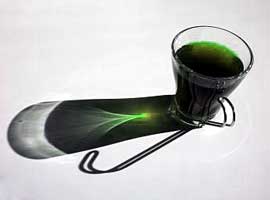
Green Tea's Cancer-Fighting Allure Becomes More Potent
PSA Rising, August 04, 2003 Green teaÂs ability to fight cancer is even more potent and varied than scientists suspected, say researchers who have discovered that chemicals in green tea shut down one of the key molecules that tobacco relies upon to cause cancer. ItÂs a find that could help explain why people who drink green tea are less likely to develop cancer.
The finding by scientists at the University of RochesterÂs Environmental Health Science Center appears in the July 2, 2003 issue of Chemical Research in Toxicology, published by the American Chemical Society.
Graduate student Christine Palermo and adviser Thomas Gasiewicz, Ph.D., set out to measure the effects of the chemicals found in green tea on a molecule (known as the aryl hydrocarbon (AH) receptor) that frequently plays a role in turning on genes that are oftentimes harmful.
Gasiewicz has previously shown how both tobacco smoke and dioxin manipulate this molecule  a favorite target of toxic substances  to cause havoc within the body, and currently his team is working to clarify exactly how substances like tobacco smoke cause cancer.
The team isolated the chemicals that make up green tea and found two that inhibit AH activity. The two substances, epigallocatechingallate (EGCG) and epigallocatechin (EGC), are close cousins to other flavonoids found in broccoli, cabbage, grapes and red wine that are known to help prevent cancer.
While green tea has been much-ballyhooed for its anti-cancer effects as well as other purported abilities such as preventing rheumatoid arthritis and lowering cholesterol, just how the substance works has been a mystery. Scientists do know that green tea contains chemicals that are anti-oxidants and quench harmful molecules. But its effects on the AH receptor have not been thoroughly evaluated until now.
ÂItÂs likely that the compounds in green tea act through many different pathways, says Gasiewicz, professor and chair of Environmental Medicine and director of RochesterÂs Environmental Health Science Center. ÂGreen tea may work differently than we thought to exert its anti-cancer activity.Â
Gasiewicz and Palermo showed that the chemicals shut down the AH receptor in cancerous mouse cells, and early results indicate the same is true in human cells as well.
In the laboratory the AH-inhibiting effects of green tea become evident when EGCG and EGC reach levels typical of those found in a cup of green tea. But the scientists say that how green tea is metabolized by the body is crucial to its effectiveness, and that results in the laboratory donÂt necessarily translate directly to the dinner table.
ÂRight now we donÂt know if drinking the amount of green tea that a person normally drinks would make a difference, but the work is giving us insight into how the proteins work, says Palermo, who enjoys cold green tea herself. ÂThere are a lot of differences between various kinds of green tea, so a lot more research is needed.Â
For this work Palermo received the award for best poster in the chemical carcinogenesis specialty section at the meeting of the Society of Toxicology in March. Now she is studying exactly how green tea inhibits the AH receptor. After she graduates Palermo plans to study links between environmental agents and childhood leukemia.
In addition to Palermo and Gasiewicz, other authors are former post-doctoral associate Jose Martin Hernando and chemist Andrew Kende, who teased apart the components of green tea extract; and Stephen Dertinger, a former student who first had the idea to test green teaÂs effects on the AH receptor. The work was funded by the National Institute of Environmental Health Sciences and the American Institute for Cancer Research.
![]()


